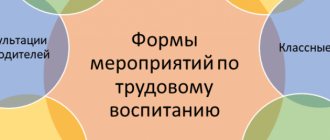Class hour in 3rd grade on the topic: Let's talk about politeness
Class hour for 3rd grade “Let's talk about politeness”
Class hour: 3rd grade Topic. Let's talk about politeness Goals: • developing in younger schoolchildren a value orientation and the ability to formulate moral judgments; • development of students’ skills to behave in accordance with moral standards and rules of etiquette; • teach children to evaluate their own politeness, as well as the politeness of other people. • show the importance of observing moral rules of communication that help create an atmosphere of trust; develop skills and habits that facilitate the establishment of contacts in communication; evoke the need to use polite words in speech, compile a dictionary of the most frequently used “polite” words in communication. Duration of using the presentation in class: 20 - 25 minutes. Equipment: laptop, TV Class progress. 1 Organizational moment. - Guys, show me what mood you are in. If it’s good, then pull yourself up on your toes, raise your arms up. If it’s bad, sit down, hug your knees with your hands. Watching a cartoon - Let's start the class hour by watching a cartoon - Conclude what important things will be discussed at today's class hour? Why did you think that? Every child should be polite; even a kitten knows politeness. You shouldn't be rude to old people And don't give way to puppies. After eating at lunch, You must say “thank you” in response, If you have done something bad, You must say “I’m sorry.” I’ll tell you a secret: “goodbye”, “hello” - These words will help you and me, And all our suffering will instantly disappear! Updating basic knowledge. Statement of educational problem. — What is the topic of the class hour? / politeness / - What goals will we set for ourselves? Discovery of something new. Opening speech by the teacher and the children - experts (Slides 2 - 3). Do you know what it means to be polite? What kind of person do you consider polite? Can a person who knows all the words always be called well-mannered? — Politeness and ability to behave depend on the overall development of a person. V. A. Sukhomlinsky wrote: “You live among people. Your every action, your every desire is reflected in people. Know that there is a line between what you want and what you can.” People have always treated kindness and politeness in a special way. Politeness is one of the most important qualities of a well-mannered person. Teacher. Let's try to determine what kind of “experts” you are in the rules of politeness. (Slides 4-5). To do this, let's play the game “Polite - Impolite.” I will name the situation, and you must say whether the actions in it were polite or not. If everything was correct, then you will clap your hands, and if not, you will stomp your feet. Working in groups is the solution to the problem. Problematic question: What does it mean to be polite? Now we will work in groups. A situation is given for each group, discuss them together and give an answer on what to do. Students in the class are divided into four micro-groups. Each micro-group is given texts and assignments for them. After reading the texts and discussing in groups, a representative of each group makes a conclusion for the rest of the micro-groups. The topic of the lesson is also determined - “Are you polite?” (Slide 6-14). Physical education minute. — I suggest you relax and solve funny riddles. These riddles are special. If they teach kindness and politeness, then in response they should say in unison: “This is me, this is me, these are all my friends!” Be careful, listen, don’t get distracted, say the right words at the right time, and remain silent when confronted with a harmful riddle. • How many of you, waking up cheerfully, “Good morning!” will he say firmly? • Who has your bag, books and notebooks in order? • Which one of you is silent like a fish instead of a kind “thank you”? • Which one of you, brothers, forgets to wash? • Which of you on a cramped tram gives up a seat to older people? • Who wants to be polite without offending kids? Pupil . In the everyday life of a polite and well-mannered person there are always words that we call “magic”. With the help of these words, you can even restore a good mood to a sad or offended person. Game “Dictionary of Polite Words” Game “Dictionary of Polite Words” (Slides 15 - 22) - Now let’s find out if you know polite words. Each micro-group stands up and finishes the poetic lines in chorus. — Only a polite, well-mannered and kind person is most often treated kindly by people around him. Such a person is loved and respected. He will always have friends with whom he will not be bored. But, by the way, there is no time for a polite person to be bored. He will always find something to do or do. What do you think a polite person can do? - Help adults, clean the house, water flowers, care for pets, shine shoes, go to the store, play with younger ones, take care of loved ones, much more. Working with cards. Lexico-spelling work. (work in pairs) (Slide 23) Task. Teacher. Explain the meaning of the words in the right column (There is a discussion in micro-groups, using the “Dictionary of Synonyms”, “Dictionary of the Russian Language”). - Describe yourself and your actions using the words in this table. Start like this: “It seems to me that when communicating with other people I ...” Play out the situation: (work in groups) (Slide 24) Teacher. Guys, now “magic” words will appear on the screen, and you will try to explain when and how they need to be pronounced. What kind of expressions are these - words of greeting, gratitude, or maybe requests. Is the task clear? Let's start. (One representative from each micro-group). The game “Magic Words” is playing (Slides 25-43). Speech by the guys - experts. Pupil . Do you know what date November 21st is? No, it's a pity! November 21 is International Greetings Day! Yes, yes, greetings. The idea of this holiday belongs to two American young men, the McCormick brothers, who proposed in 1973 to celebrate a day of friendship and mutual understanding between the peoples of all countries of the world (Slide 44). Teacher . All greetings have one thing in common - “wishes of goodness and prosperity.” The code of decency in the East contains an ancient verse: “A person who is not familiar with the rules of politeness, who does not observe decency, brings harm not only to himself, but also to others; shame falls on the heads of his parents and all persons who have and do not have anything to do with him” (Slide 45). Pupil. Another wonderful date. January 11 is World Thank You Day. The most “polite” date of the year! The word “thank you” has been known in Russian since the 16th century. It comes from the words “God bless” - this phrase in Rus' was used to express gratitude. Now “thank you” is a new word that means “I thank you and wish you all the best” (Slide 46). Teacher. Words of gratitude are signs of attention; they are verbal “strokes” and can warm you with their warmth. Every day we say “thank you” to each other, so it is very important to remember that true gratitude is only that which comes only from a pure heart! A well-mannered person cannot be evil, because good manners are real when they are sincere and natural. This means good manners are always next to kindness, a friendly attitude towards each other and towards the environment. Student. February 17 is Spontaneous Kindness Day, one of the recent initiatives of international charitable organizations. In Russia, this holiday is practically not known at all. It is assumed that on this day people should try to be not just kind, which is self-evident, but infinitely and selflessly kind (Slide 47). Teacher. We recognize a person not only by words, but also by gestures, by the expression of his face. It turns out that when talking, people attach only 7% importance to words, 38% to intonation, and 55% to facial expressions and gestures. One wrong gesture can completely change the meaning of spoken words (Slide 48). Teacher . A smile is especially highly valued in communication. Vladimir Soloukhin spoke about this very well: “Almost everything in a person is intended for himself ... except for a smile. You don't need a smile for yourself. If it weren't for the mirrors, you would never even see her. A smile is intended for other people to make them feel good, happy and at ease with you” (Slide 49). Lesson summary. Reflection task. Teacher . Look carefully at the screen and think about what this picture might be called (Slide 50-51). Student Answers - Remember the colors of the rainbow, draw it in your notebook and fill each color strip with the quality that you think you have. Exhibition of works.
Presentation on the topic: Politeness
We recommend watching:
Class notes for 3rd grade Class hour 3rd grade. Bread is the head of everything Class hour 3rd - 4th grade. My friend - book Thematic class hour on ecology, grades 3-4
Similar articles:
Class notes in elementary school: “I am a family – Mordovia – Russia”
Class hour in 3rd grade. Communication culture
Class hour in 3rd grade on the topic: Etiquette
Cool hours in 3rd grade
Class hour in 3rd grade with a psychologist






